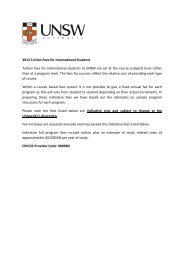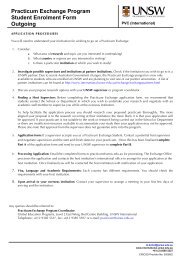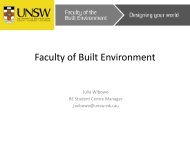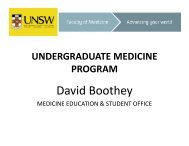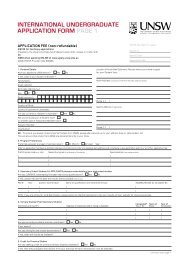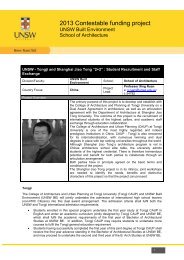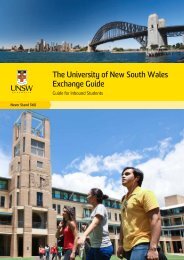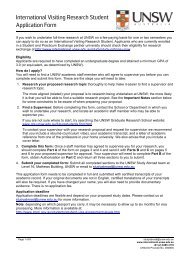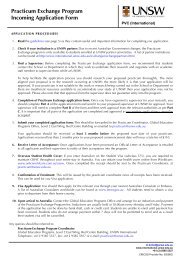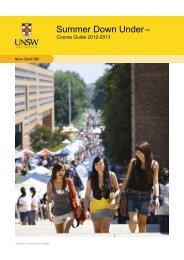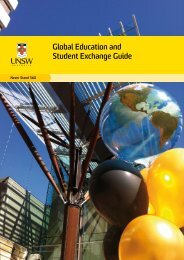undergraduate - UNSW International - The University of New South ...
undergraduate - UNSW International - The University of New South ...
undergraduate - UNSW International - The University of New South ...
You also want an ePaper? Increase the reach of your titles
YUMPU automatically turns print PDFs into web optimized ePapers that Google loves.
64 | <strong>UNSW</strong> <strong>International</strong> Undergraduate Guide 2011 | www.unsw.edu.auprogram information | M-NPhase 2Practice-Based Learning consists <strong>of</strong> modules withincreased clinical content and an emphasis oncorrelation between prior and current learning.Learning involves interactions with patients in clinicalenvironments combined with small group tutorials,integrated science practicals, and an extended casebasedmethodology. In addition, students engagein an independent learning research project over 32weeks.Phase 3Independent Reflective Learning consists <strong>of</strong> moduleswith a clinical focus, but still includes relevant contentfrom the basic medical and social sciences. Studentswill be attached to real work teams and will be inpositions <strong>of</strong> increasing responsibility. <strong>The</strong> settingsfor these experiences represent a balance withinhospitals, ambulatory practice and those involvingboth.<strong>The</strong>re are four principal organisers called domainswhich organise the program through all three phases,and provide an explicit mechanism for verticalintegration <strong>of</strong> content. Within each domain, thereare four major themes which provide opportunitiesfor students to engage content in an integratedfashion in the contexts <strong>of</strong> health scenarios, clinicalpresentations, or specific patient problemsencountered during clinical experience.Domain 1Beginnings, Growth and Development: Conception,Pregnancy and Birth; Childhood Growth andDevelopment; Puberty, Adolescence, Sexuality andRelationships; Nutrition, Growth, and Body Image.Domain 2Health Maintenance: Homeostasis, Sustenance,and Equilibrium; Education, Health Promotion, andDisease Prevention; Host Defence; Lifestyle FactorsThat Risk Health.Domain 3Ageing and Endings: Menopause; <strong>The</strong> AgeingProcess; Degenerative Disease; Death, Dying andPalliative Care.Domain 4Society and Health: Society, Culture and Genes;Socioeconomic Determinants <strong>of</strong> Health; HealthDelivery Systems; Health and Human Rights.Career Opportunities andRegistrationAfter completing formal program requirements forthe award <strong>of</strong> the MBBS degree, the new graduate is`registered’ by a medical board and works for at leastone year in selected hospitals before obtaining finalregistration as a medical practitioner. <strong>International</strong>students should check with registration bodies toconfirm the registration process.A further period <strong>of</strong> at least five years experience andspecialised study under the supervision <strong>of</strong> one <strong>of</strong>the specialist colleges is required before specialistqualifications can be obtained. Careers in areas otherthan the practice <strong>of</strong> clinical medicine as a generalpractitioner or specialist include medical research,medical administration, journalism and publishing.Bachelor <strong>of</strong> Exercise PhysiologyProgram code 3871FacultyMedicineMin. years 4 yearsUOC (per year/total) 48/192Semester 2 entry YesEst. first year tuition A$28,560Est. fee to complete A$129,040Assumed Knowledge Maths and ChemistryOnline Handbook www.handbook.unsw.edu.au/<strong>undergraduate</strong>/programs/2010/3871.htmlWebsitewww.med.unsw.edu.auWhat is exercise physiology?Exercise Physiology is an emerging allied-healthpr<strong>of</strong>ession which provides specialist exercise servicesfor the prevention and management <strong>of</strong> chronicdisease and injuries. Exercise Physiologists (EPs)provide clinical exercise therapy for people withcardiovascular (e.g. heart disease) and metabolic(e.g. diabetes) conditions, musculoskeletal conditions(e.g. arthritis or workplace injuries), neuromusculardisorders (e.g. stroke) and other conditions, includingcancer and depression. EPs also deliver exercise andlifestyle change programs for the primary prevention<strong>of</strong> disease in apparently healthy populations.Program StructureYear 1Foundation science courses and introduction to thepr<strong>of</strong>ession.Introductory Exercise Science; Chemistry; Molecules,Cells and Genes; Anatomy; Psychology; Statistics;Exercise Programs and Behaviour.Year 2Comprehensive foundation in biomedical sciencesplus exercise science courses.Biochemistry; Human Physiology; ExercisePhysiology; Functional Anatomy; Biomechanics;Processes in Disease.Year 3Greater depth in medical science courses andpr<strong>of</strong>ession specific courses.Physical Activity and Health; Clinical ExercisePhysiology; Pharmacology in Exercise; Muscleand Motor Control; Movement Rehabilitation;Neuromuscular Rehabilitation; Electives; GeneralEducation courses.Year 4Courses emphasise the consolidation <strong>of</strong> clinical skillsand knowledge, and skills for independent learning.Major Clinical Practicum; Research Seminars;Research Project; Electives; General Educationcourses.Year 3 and 4 Electives include:Advanced Exercise Physiology; Physical Activityin Special Populations; Public Health; HealthPromotion; Healthy Planning; Health Psychology;Nutrition; Advanced Nutrition; Human Biochemistry;Musculoskeletal Diseases; Cardiovascular Physiology;Endocrine Physiology; Science Communication.Clinical Training commences from Year 1 and isprimarily supported by the <strong>UNSW</strong> Lifestyle Clinic.Placements in Year 4 are completed within the <strong>UNSW</strong>Lifestyle Clinic and clinical schools in hospitals, aswell as other hospitals and private practices.Career OpportunitiesExercise Physiologists are employed in rehabilitationclinics and hospitals working in post-acuterehabilitation, sports medicine clinics, corporatehealth and private practice for rehabilitation/exerciseprescription for people requiring specialist guidance(e.g. workplace rehabilitation departments);corporate health; health and fitness centres; sportsacademies and institutes; sporting associations;universities and colleges; and private practice.SEE ALSOBachelor <strong>of</strong> Sciencemajors in Anatomy, Biochemistry and MolecularBiology, Chemistry, Genetics and Molecular Genetics,Immunology, Microbiology, Pathology, Physics,Physiology and Pharmacologypage 67,68Bachelor <strong>of</strong> Science (Advanced)page 68MusicBachelor <strong>of</strong> MusicProgram code 3425FacultyArts and Social SciencesMin. years 3 yearsUOC (per year/total) 48/144Semester 2 entry NoEst. first year tuition A$21,840Est. fee to complete A$72,360Assumed Knowledge Audition/Interview requiredOnline Handbook www.handbook.unsw.edu.au/<strong>undergraduate</strong>/programs/2010/3425.htmlWebsitehttp://empa.arts.unsw.edu.auMusic at <strong>UNSW</strong><strong>UNSW</strong> <strong>of</strong>fers a Bachelor <strong>of</strong> Arts (BA) with a majorsequence in music and a Bachelor <strong>of</strong> Music (BMus)degree. <strong>The</strong> BMus allows a greater degree <strong>of</strong>specialisation in music than the BA, and providesopportunities for pr<strong>of</strong>essional development in theareas <strong>of</strong> musicology, musicianship, ethnomusicology,performance, composition, music technology, jazzstudies and music analysis.Career OpportunitiesGraduates work in the areas <strong>of</strong>: performance,teaching, broadcasting, arts management,composition, conducting, recording and filmindustries, arts journalism and advocacy.Combined DegreesBachelor <strong>of</strong> Music/Bachelor <strong>of</strong> ArtsProgram code 3427FacultyArts and Social SciencesMin. years 4 yearsUOC (per year/total) 48/192Semester 2 entry NoEst. first year tuition A$21,840Est. fee to complete A$99,280Assumed Knowledge Audition/Interview requiredOnline Handbook www.handbook.unsw.edu.au/<strong>undergraduate</strong>/programs/2010/3427.htmlWebsitehttp://empa.arts.unsw.edu.au<strong>The</strong> Bachelor <strong>of</strong> Music/Bachelor <strong>of</strong> Arts is a four-yearcombined degree that augments the full pr<strong>of</strong>essionaltraining <strong>of</strong> the BMus program with an extensiverange <strong>of</strong> other options within the Faculty <strong>of</strong> Arts andSocial Sciences (e.g. English, History, Sociology orAnthropology).



